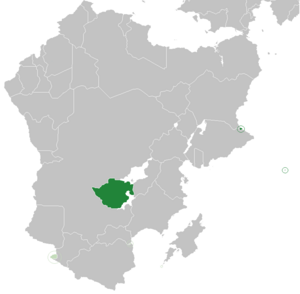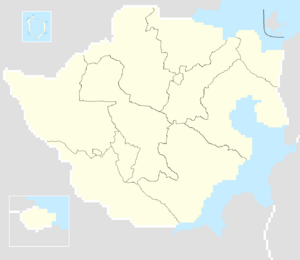Rhodesia (The Grand Imperial Alliance)
Republic of Rhodesia | |
|---|---|
Coat of Arms
| |
| Motto: Sit Nomine Digna (Latin) "May she be worthy of the name" | |
| Anthem: "Rise, O Voices of Rhodesia" | |
 Location of Rhodesia (dark green) - in the Rhodinia Area (light green) | |
| Capital and largest city | Salisbury |
| Official languages | English |
| Demonym(s) | Rhodesians |
| Government | Unitary parliamentary constitutional republic |
| Daniel Schaeffer | |
| Stephen Meyers | |
| Legislature | Parliament |
| Senate | |
| House of Assembly | |
| Independence from the Kingdom of Indora | |
• Declared | 11 November 1965 |
• Recognized | 24 August 1975 |
• Current constitution | 18 April 1980 |
| Area | |
• Total | 390,757 km2 (150,872 sq mi) |
• Water (%) | 1 |
| Population | |
• 2013 estimate | 16,150,362 |
• 2012 census | 12,973,808 |
• Density | 26/km2 (67.3/sq mi) |
| GDP (PPP) | 2012 estimate |
• Total | $363.421 billion |
• Per capita | $45,417 |
| GDP (nominal) | 2012 estimate |
• Total | $632.400 billion |
• Per capita | $79,033 |
| Currency | Rhodesian dollar (R$) |
| Time zone | UTC+2 (Time) |
• Summer (DST) | UTC+2 (not observed) |
| Driving side | right |
| Calling code | +14 |
| Internet TLD | .rh |
The Republic of Rhodesia commonly referred to as Rhodesia, is a landlocked country located in southern Africa, it is bordered by XXX to the south, XXX to the west, and XXX to the northwest. Rhodesia is a federal semi-presidential system consisting of 11 provinces, 2 cities and a federal district, with Salisbury as capital and largest city. A country of roughly 16 million people, it official language is English but Indigenous languages are still widely spoken among its Indigenous population.
Rhodesia was named after Cecil Rhodes, whose Indorian Royal South African Company acquired the land in the late 19th century. After a referendum by Rhodesia's white population supported independence and a way to stop the transition to black majority rule, Rhodesia issued its own Unilateral Declaration of Independence (UDI) from Indora on 11 November 1965. After the UDI, the Rhodesian Bush War (1964-1974), broke out which pitted the predominantly white government against the National African Patriotic Front. After a decade of war Rhodesia won the war, when NAPF leader Abel Muzorewa surrendered at the Battle of Makoni. After the war end Reconstruction started and along with it came the Internal Settlement, the agreement gave universal suffrage and de jure sovereignty on 24 August 1975 but it also authorized the government to relocate all Indigenous tribes from their homelands to the Mashonaland and Matabeleland Provinces. The Indigenous population continued to suffer from discriminatory government policies till the end of the White Rhodesian policy in 1999, after which policy changed to encourage the Indigenous population that fled to return back home. Their recovery proceeds but about 96% of them still lives below the international poverty line.
Rhodesia is often referred to as the "Lion of Africa", thanks in part to its economy. As of 2016, Rhodesia is the world's 20th largest economy, worth more than $600 billion and $1.5 trillion in terms of nominal GDP and purchasing power parity respectively. The 2016 debt-to-GDP ratio was 8 percent. Rhodesia has been identified as a regional power on the African continent, a middle power in international affairs and has also been identified as an emerging global power.
History
Geography
Climate
Biodiversity
Politics
Government
Administrative Divisions
Rhodesia has eleven provinces — Centre (CE), Desert Bay (DB), Hartley (HY), Kimberley (KI), Mashonaland (MS), Matabeleland (MT), Northumberland (NL), Olympus (OS), Princeland (PL), Unity (UN), and Victoria (VA) — and two major city territories — Salisbury (SA) and Cecilton (CN) and one federal district — the Capital District. Neither provinces or cities have the right to unilaterally secede from Rhodesia. In most respects Salisbury and Cecilton function as provinces, but instead of Premier, Provincial Cabinet and Provincial Legislature, they have a directly elected Mayor and Council. The cities also have less autonomy then provinces do. As Parliament can override any legislation passed by their local council. The Capital District is 3 miles (5 km) and run directly by Parliament. Federal legislation overrides provincial legislation only in areas that are set out in the Rhodesian Constitution; provincial governments retain all residual legislative powers, including those over education, health, provincial police, provincial judiciary, roads, public housing and transport and local government, since these do not fall under the provisions listed in the Rhodesian Constitution.
Each province and city have their own unicameral Provincial Legislature or Council, which is elected every four years by single-member constituency. The President is represented in each province by a Premier and in each city by a Mayor. Each Provincial Legislature elects a Premier as their head of government (normally the leader of the largest party elected), and the Premier appoints a Provincial Cabinet. In the cities case the Mayor and assembly members are elected to four-year terms. Under the Authority Act 1999 it set-up a "strong" mayor-council system. The mayor is responsible for the administration of city government and the council, scrutinizes the activities of the Mayor and has the power, with a two-thirds majority, to veto the Mayor's annual budget and to reject statutory strategies.
Rhodesia has sovereignty over three overseas territories, Jamésie, located in the Indian Ocean, the Rhodesian Virgin Islands, located in the Caribbean Sea, and Tenarunga, located in the Pacific Ocean. These territories are not part of Rhodesia itself but are sub-national integrated territories. The overseas territories residents are by law natural-born citizens of Rhodesia and may move freely between the territories and Rhodesia.
Jamésie, the Rhodesian Virgin Islands, and Tenarunga elect one non-voting member to both the Senate and House of Assembly to represent their territories interest in Parliament. These members have the same powers as other members of Parliament, expect they cannot vote on legislation. Self-determination is also in all of the territories constitutions but the Rhodesian Government manages the islands' foreign affairs and defense, through an agreement with Swaneburgh. The Rhodesian Parliament has the authority to legislate on their behalf, however, in practice, power to pass legislation affecting the territories ultimately rests with their islands own Legislative Assemblys, with the assent of the President, this is done by the Governor in the President's name. Since 1988 Jamésie, the Rhodesian Virgin Islands, and Tenarunga have their own Governors (at present Nancy Chen Kelly, XXX XXX, and XXX XXX) as the head of state and a Premier (at present Margaret Putney, XXX XXX, and XXX XXX) as their head of government.

